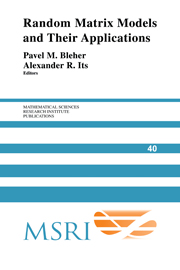Book contents
- Frontmatter
- Contents
- Preface
- Symmetrized Random Permutations
- Hankel Determinants as Fredholm Determinants
- Universality and Scaling of Zeros on Symplectic Manifolds
- z-Measures on Partitions, Robinson-Schensted-Knuth Correspondence, and β = 2 Random Matrix Ensembles
- Phase Transitions and Random Matrices
- Matrix Model Combinatorics: Applications to Folding and Coloring
- Interrelationships Between Orthogonal, Unitary and Symplectic Matrix Ensembles
- Dual Isomonodromic Tau Functions and Determinants of Integrable Fredholm Operators
- Functional Equations and Electrostatic Models for Orthogonal Polynomials
- Random Words, Toeplitz Determinants, and Integrable Systems I
- Random Permutations and the Discrete Bessel Kernel
- Solvable Matrix Models
- The τ-Function for Analytic Curves
- Integration over Angular Variables for Two Coupled Matrices
- Integrable Lattices: Random Matrices and Random Permutations
- SL(2) and z-Measures
- Some Matrix Integrals Related to Knots and Links
Preface
Published online by Cambridge University Press: 25 June 2025
- Frontmatter
- Contents
- Preface
- Symmetrized Random Permutations
- Hankel Determinants as Fredholm Determinants
- Universality and Scaling of Zeros on Symplectic Manifolds
- z-Measures on Partitions, Robinson-Schensted-Knuth Correspondence, and β = 2 Random Matrix Ensembles
- Phase Transitions and Random Matrices
- Matrix Model Combinatorics: Applications to Folding and Coloring
- Interrelationships Between Orthogonal, Unitary and Symplectic Matrix Ensembles
- Dual Isomonodromic Tau Functions and Determinants of Integrable Fredholm Operators
- Functional Equations and Electrostatic Models for Orthogonal Polynomials
- Random Words, Toeplitz Determinants, and Integrable Systems I
- Random Permutations and the Discrete Bessel Kernel
- Solvable Matrix Models
- The τ-Function for Analytic Curves
- Integration over Angular Variables for Two Coupled Matrices
- Integrable Lattices: Random Matrices and Random Permutations
- SL(2) and z-Measures
- Some Matrix Integrals Related to Knots and Links
Summary
This volume represents the most recent trends in the random matrix theory with a special emphasis on the exchange of ideas between physical and mathematical communities. The main topics include:
• random matrix theory and combinatorics
• scaling limits; universalities and phase transitions in matrix models
• topologico-combinatorial aspects of the theory of random matrix models
• scaling limit of correlations between zeros on complex and symplectic manifolds Most contributions are based on talks and series of lectures given by the authors during the MSRI semester “Random Matrix Models and Their Applications” in Spring 1999, and have an expository or pedagogical style.
One of the basic ideas of the MSRI semester was to bring together the leading experts, both physicists and mathematicians, to discuss the latest results in the theory of matrix models and its applications. The book follows this line: it is divided roughly in half between physics and mathematics. The papers by physicists (G. Cicuta; Ph. Di Francesco; V. Kazakov; G. Mahoux, M. Mehta, J.-M. Normand; P. Zinn-Justin) give an overview of different physical problems in which the random matrix theory plays a decisive role, along with a rich variety of methods and ideas used to solve the problems. This includes enumeration of Feynman graphs on Riemann surfaces in the context of two-dimensional quantum gravity, spin systems on random surfaces, “meander problem” and random foldings, enumeration of knots and links, phase transitions and critical phenomena in random matrix models, interacting matrix models, etc.
Information
- Type
- Chapter
- Information
- Random Matrix Models and their Applications , pp. ix - xPublisher: Cambridge University PressPrint publication year: 2001
